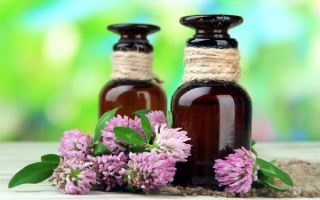Content
- 1 What does clover look like and where does it grow?
- 2 Clover chemical composition
- 3 Why clover is useful
- 4 What diseases does clover treat?
- 5 Traditional medicine recipes with clover
- 6 The benefits and preparation of medicinal clover tea
- 7 The use of clover in home cosmetology
- 8 Harm of clover and contraindications
- 9 Collection, harvesting and storage of clover
- 10 Conclusion
- 11 Reviews
The benefits and harms of clover are an interesting topic for fans of traditional medicine. A small nondescript flower has a lot of valuable properties, you need to get acquainted with them and learn about the areas of application.
What does clover look like and where does it grow?
In the entire central zone of Russia, in Siberia and the Far East, in Europe and even in North Africa, a small flower grows in meadows and roadsides - clover. In height, it usually reaches no more than 60 cm, the stems of the flower are branched and straight, and the leaves are trifoliate, bright green, rounded in shape.
White or red inflorescences are easy to recognize - they look like rounded heads, consisting of many sharp and thin petals pointing upwards. The plant blooms in June and July.
Clover chemical composition
The benefits and harms of red clover for the body are explained by its composition. Meadow flower contains:
- amino acids and glycosides;
- phytosterols;
- resins and tannins;
- a small amount of alkaloids;
- fiber and flavonoids;
- salicylic acid;
- ketoglutaric and p-coumaric acids;
- essential oil containing coumarin and furfural;
- fixed oils;
- calcium and phosphorus;
- vitamins B1 and B2;
- vitamins A, E, K, C and P.
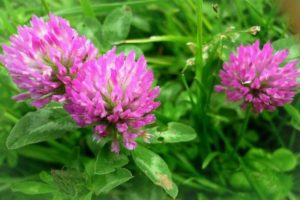
Why clover is useful
The properties of the flower are valued in folk medicine because medicines based on it:
- have a strengthening effect on the immune system and cleanse the body - clover is very valuable for the liver;
- relieve inflammation and fight infectious processes;
- improve metabolism and promote healthy stomach and intestines;
- strengthen the walls of blood vessels and prevent the occurrence of heart disease, clover is also useful for cholesterol;
- restore damaged skin, improve the condition of hair and skin;
- have a disinfecting and anti-inflammatory effect in psoriasis, fungi and eczema.
A particular benefit of white clover or porridge is that its properties are blood thinners. The flower serves as the prevention of thrombosis and varicose veins. As for the plant with red inflorescences, clover benefits in oncology, thanks to coumarin and other components in the composition.
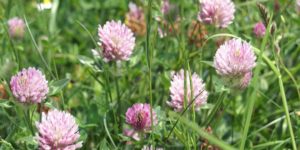
For women
The health benefits of clover for women is that it relieves gynecological ailments. Infusions and decoctions based on it equalize the hormonal background and reduce painful sensations. A useful flower helps to improve mood during heavy periods, relieves the condition during menopause.
For men
The benefits of clover for the body of men is that the medicinal plant is a natural aphrodisiac. With regular use, the properties of the flower improve potency.In addition, the positive effect of the plant on blood vessels protects men from sudden heart attacks and strokes.
What diseases does clover treat?
Traditional medicine recommends using the flower for:
- therapy for colds, coughs, bronchitis, asthma and tuberculosis;
- treatment of cardiovascular ailments;
- lowering cholesterol levels and cleansing the body of toxins;
- treating diseased joints - the flower helps with osteoporosis, arthritis, rheumatism;
- normalization of digestion - in small quantities, clover will not be harmful for gastritis.
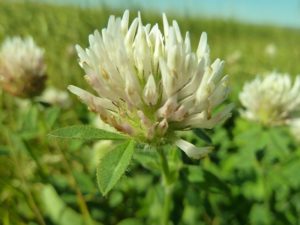
For cerebral vessels, clover is also very useful - its properties prevent the development of Parkinson's disease.
Traditional medicine recipes with clover
In home medicine, all parts of the plant are used - its flowers, leaves, roots and seeds. There are proven recipes for useful remedies.
Decoction of clover leaves and flowers
For stomach and intestinal ailments, colds and coughs, inflammatory processes, a decoction of clover from flowers and leaves is used. It is made as follows:
- 1 large spoonful of dry raw materials is poured with a glass of boiling water;
- bring to a boil over low heat and cook for a minute;
- removed from the stove and insisted closed for another hour.
The cooled and strained broth can be consumed three times a day, shortly before meals. A single dosage is half a glass - you cannot drink the product in large quantities, it will be harmful.
The benefits of clover decoction will help with skin ailments or injuries, with eye inflammation. In such situations, the properties of the drink are used for washes - gauze or a cotton pad is moistened in a useful broth and wipe the sore spot.
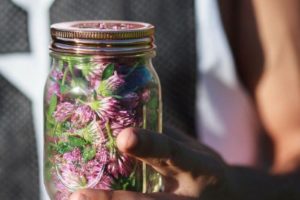
Clover root decoction
A decoction of clover is widely used for cleaning blood vessels, prepared from the roots of the plant. It also helps against coughs, bronchitis and other respiratory diseases.
- 20 g of finely chopped roots are poured with a glass of boiling water.
- Steamed for half an hour.
- Cool the finished product, drain it and add clean water to its original volume.
Drink a useful remedy on an empty stomach in 1 large spoon. You can take a decoction of the roots 6 times a day.
Infusion of clover
An effective and easy-to-prepare medicine is an infusion of clover for cholesterol, dry cough and diarrhea on dry leaves and flowers. To prepare it, it is enough to pour 2 large tablespoons of raw materials with a glass of boiling water, cover with a lid and stand for an hour. Then the product is filtered and drunk before meals up to 4 times a day for half a glass.
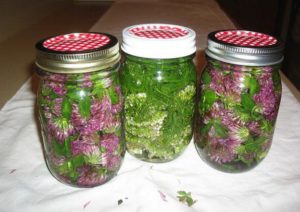
Alcohol tincture of red clover
Clover tincture on vodka is popular for vessels, its useful properties can hardly be overestimated. The remedy helps with atherosclerosis and colds, with anemia and chronic fatigue, with high cholesterol and hypotension. Tincture of clover flowers can be used to rinse your mouth and throat in case of inflammatory processes. But in this case, it must be diluted in half with water, otherwise it will harm the mucous membranes.
To prepare the product, 4 large tablespoons of dried leaves and flowers are poured into a glass vessel, poured with alcohol or vodka and removed to a dark place for 10 days.
The finished product is filtered and taken in minimal dosages - 1 teaspoon before meals, no more than three times a day.
Clover seed tincture
To prepare a tincture on the seeds of a medicinal plant, a large spoonful of seeds is poured with a glass of red wine, and then the agent is kept steaming for half an hour. The indications for clover tincture are, first of all, problems with potency in men, since the remedy is a good aphrodisiac.
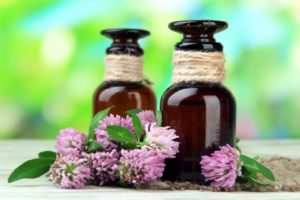
For a high-quality effect, you need to drink the product for at least a month, in the amount of 1 large spoon three times a day.
Clover juice
For medicinal purposes, you can use healthy juice obtained from leaves, stems and flowers. For cooking you need:
- take fresh raw materials;
- scroll in a meat grinder or grind in a blender;
- squeeze the juice from the resulting gruel through cheesecloth.
In the form of juice, the benefits of clover for the body are maximal - the drink retains all the beneficial properties, since it does not undergo heat treatment. The drug is taken orally by a third of a glass three times a day. The juice helps with colds, anemia and inflammatory diseases, coughs and weakened immunity.
Clover Oil Extraction
A popular treatment for wounds, cuts, ulcers and burns is the plant-based oil extract. A handful of dried flowers and leaves are poured with olive or other vegetable oil and removed to a dark place for 2 weeks.
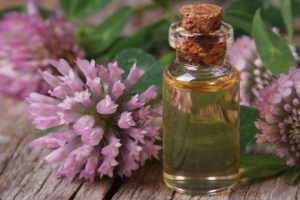
The benefits of clover herb in the oil extract are for skin care only. You cannot use the product inside, it will harm.
Fresh crushed leaves and inflorescences
The benefits of meadow clover are manifested in a homemade ointment made from flowers and leaves. A fresh plant is thoroughly grinded with a mortar or chopped in a blender. The resulting gruel is simply applied to damaged skin and covered with a sterile bandage for a quarter of an hour.
The benefits and preparation of medicinal clover tea
The beneficial properties of clover tea are that it increases immune resistance, helps fight colds and strengthens blood vessels. Often they give clover tea for coughs to children, kids drink it more willingly than decoctions or infusions.
Classic clover tea
To prepare a drink you will need:
- pour boiling water over 1 small spoonful of dried flowers and leaves;
- infuse clover tea for 5 minutes;
- drink throughout the day.
Healthy clover tea is consumed not like regular tea, but in small portions, several sips at a time.
Clover mint tea
To prepare a fragrant tonic drink, you need:
- pour 5 parts of dry raw materials into a teapot;
- add 1 part each dried St. John's wort and mint;
- pour boiling water over and wait 10 minutes.
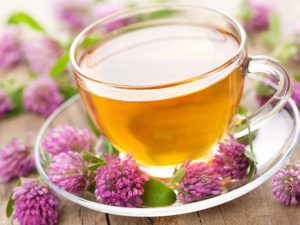
You can drink this drink in the usual way. The benefit of mint red clover tea is that it has a relaxing effect and strengthens the immune system.
Clover tea with oregano
Fans of fragrant herbal preparations will love the clover tea with oregano. For cooking you need:
- pour 4 parts of the dried raw material into the teapot;
- add 2 parts of dry mint, St. John's wort and currant leaves;
- supplement the collection with 1 part of oregano.
Tea is brewed in the usual way and drunk as a tonic and anti-cold remedy, sweetened with honey if desired.
The use of clover in home cosmetology
The benefits and harms of clover for health are also manifested in folk beauty recipes. The properties of the flower not only promote healing of injuries, but also increase the elasticity of the skin and rejuvenate it. Plant-based products benefit hair by strengthening it and bringing back a healthy shine.
Masks and decoctions for the face
The benefits of clover decoctions and masks are the refreshing and cleansing properties of the plant. There are many simple skin care recipes. For instance:
- to moisturize dry skin and remove fine wrinkles, you need to grind the flowers and leaves of the plant, thoroughly mix the gruel with 1 teaspoon of liquid honey and apply on the face for a quarter of an hour;
- a simple decoction of clover for the face will help well against skin irritations and acne, the product will have an anti-inflammatory and tonic effect if you wash your face with it in the morning.
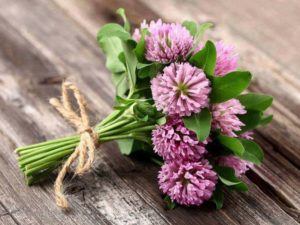
The listed funds must be used at least twice a week, then the effect will be stable.
Hair beauty recipes
The beneficial properties of the meadow flower help restore beauty to weakened curls and get rid of dandruff.
- To restore brittle and dull hair, you need to prepare a strong infusion of 3 tablespoons of crushed flower in a glass of boiling water. The product is kept under the lid for 3 hours, then filtered and rubbed into the hair roots daily.
- A combined herbal infusion will help get rid of dandruff. Crushed clover leaves and flowers, nettle and St. John's wort are mixed in equal amounts, poured with cosmetic tea oil, covered with a lid and insisted for 9 days. The finished product is slightly warmed up and rubbed into the scalp for 3 hours.
Harm of clover and contraindications
The properties of the meadow flower can not only strengthen the body, but also bring harm if used carelessly. It is prohibited to use infusions and decoctions:
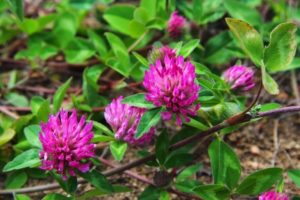
- with varicose veins and thrombophlebitis, the flower is useful only as a prophylaxis, with existing ailments it will be harmful;
- with serious diseases of the liver and kidneys;
- during pregnancy and during breastfeeding;
- with severe ailments of the heart and blood vessels;
- with hypertension;
- with estrogen-dependent forms of oncology.
Side effects of clover include vomiting, dizziness, rash, or muscle pain. For women, the harm of a flower is expressed in an increased risk of uterine bleeding.
Collection, harvesting and storage of clover
You need to collect red or white clover during the natural flowering period - in the middle of summer. For collection it is necessary to select only fresh, healthy, unfading and undamaged inflorescences. It is advisable to cut them along with the stem and top leaves, as these parts will also come in handy in homemade recipes.
It is necessary to dry flowers in an open place with good ventilation, but away from sunlight. In this case, it is important to remove the raw material from drying before the inflorescences and leaves become completely dry and begin to crumble.
Dried flowers are packaged in linen bags and put away in a dry, dark place. The benefits of dried clover persist throughout the year - then it is advisable to harvest again.
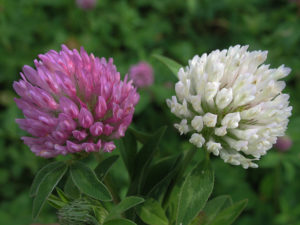
Conclusion
The benefits and harms of clover are a matter of careful use. The medicinal plant should not be used if there are contraindications or in too large a dosage. But if the rules are followed, the flower will not bring harm, but great benefit.

